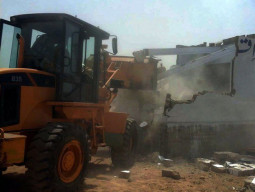
Most of the union councils and union committees of Sindh, which form the basic unit of the local government system, are seen to utilise only around 30 per cent of total funds allocated to them on development expenditure in their respective areas.
The remaining 70 per cent is exhausted in non-development expenses, a major chunk of which also includes salaries for employees.
This information has come to light in a report of the Auditor General of Pakistan, covering union committees and union councils of Sindh for the year 2018-19, that was presented before the Sindh Assembly on July 04, 2022.
Among various operations that the document laid bare, it also revealed that in Karachi, the union committees of district South and Korangi, however, had spent more on development as compared to employee salaries that particular year.
According to the local governments' law, urban areas of the province are represented by union committees, while rural areas have union councils.
Karachi at present has no union council as whole of the city now falls under administrative control of Karachi Metropolitan Corporation (KMC) after abolishment of the city's district council.
Total number of districts in Karachi now stand at seven, following creation of the new district, Kemari, last year. Per the law, the port city now has a total 246 union committees. Of those, Karachi Central, as the largest district of the metropolitan, has 45 union committees.
The second largest district, Karachi East, has 43 union committees.
Other districts include Korangi with 37 union committees, Malir with 30, West with 33, South with 26 and Kemari with 32 union committees.
The audit report further discloses that union committees of Karachi, except district South and Korangi, have been spending lesser funds on development of their respective areas.
For reference, committees of district South spent over Rs71 million on development and Rs57 million on salaries of their employees.
Similarly, the union committees of the district Korangi utilised Rs48 million for development and Rs43 million on salaries during the same financial year.
Contrary to these two districts, union committees of the district East spent only Rs44 million on development, out of Rs294 million they had utilised during 2018-19. More than Rs169 million were spent on payment of salaries only.
The union committee had also utilised another Rs81 million on other non-development expenditure, the report reveals. Similarly, the union committees of district Central utilised more than Rs134 million during the same period, but spent only Rs57 million on development of the area.
According to official figures, over Rs72 million were spent only on salaries of employees of the union committees. The audit report shows that union committees of the district West, spent Rs96 million on development of the area out of a total of Rs243 million that they utilised during the year 2018-19.
A huge amount of over Rs126 million was spent on salaries of employees of these union committees during the same period. Union committees of district Malir in a similar vein, only spent only Rs29 million on development out of a total of Rs116 million that they utilised during the 2018-19 year.
Over Rs66 million were spent on payment of salaries of employees during the same financial year.
According to Sindh Minister for Local Governments Syed Nasir Hussain Shah, over employment in union councils and committees is a key reason for the aforementioned statistic.
"The provincial government is trying to encourage the local bodies to increase funds allocated to the development side," he told The Express Tribune, while explaining how the provincial government plans to respond to the audit report.


















COMMENTS
Comments are moderated and generally will be posted if they are on-topic and not abusive.
For more information, please see our Comments FAQ